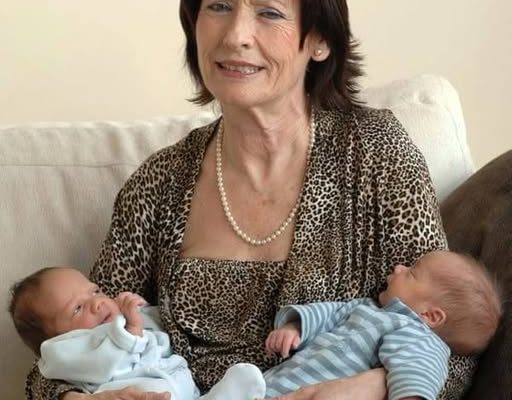Motherhood is one of the oldest and most profound roles in human history — a journey that can begin in countless ways. For some women, it happens in youth, bringing new life into the world before their own adult lives have fully unfolded. For others, it comes later, after years of patience, longing, or unexpected turns of fate. And for some, the path is met with heartbreak or barriers that prevent them from carrying a child of their own.
There is no single “right” moment to become a mother. Every birth is a cause for celebration, and every woman who carries a child should be honored for the remarkable physical and emotional journey it requires. Yet, society doesn’t always see it that way.
In 2006, Maria Carmen del Bousada de Lara, a retired shop employee from Cádiz, Spain, made headlines around the world when she gave birth to healthy twin boys — Christian and Pau — at the age of 66. At the time, she became the oldest mother in the world.
Maria’s journey to motherhood wasn’t simple. Determined to have children despite her age, she sold her home to pay for IVF treatment at a clinic in California. Reports later revealed she told doctors she was 55 — well below her real age — to qualify for the procedure. For Maria, the decision was deeply personal. She believed no one should be pressured into having children on society’s timeline, and that everyone should have the freedom to choose when to start a family.
Still, her choice sparked controversy. Many criticized her, including members of her own family, who called the decision selfish. Maria admitted she hid her pregnancy at first, and when she finally shared the news, her relatives thought she was joking.
Against the odds, she delivered Christian and Pau safely. But just six months later, her joy was clouded by tragedy — Maria was diagnosed with ovarian cancer. “They’re still babies, so I haven’t told them,” she said at the time. “They’re too young for these things.”
As her illness progressed, her family stepped in to help care for the twins. In 2009, Maria passed away, leaving behind her young sons after only a few short years together. Her brother Ricardo reflected on her choice: “I think she has done this too late in life… but now they are here. We love these beautiful boys.”
Neighbors in Cádiz, like local resident Pilar Pinto, have since spoken warmly about the boys’ lives. “They are being well taken care of and are in great shape,” Pinto shared. “God didn’t let her enjoy her children very much. He should have given her more time.”
Until the end, Maria stood by her decision. For her, the dream of motherhood was worth the criticism, the risks, and the sacrifices.
Her story continues to stir debate — was it selfish, or was it simply her right? Perhaps it’s both a reminder of the power of choice and the fragility of time. What’s certain is that Maria’s journey left behind two sons who are loved, cared for, and thriving — and a legacy that challenges us to think about what it really means to choose the “right time” for motherhood.



